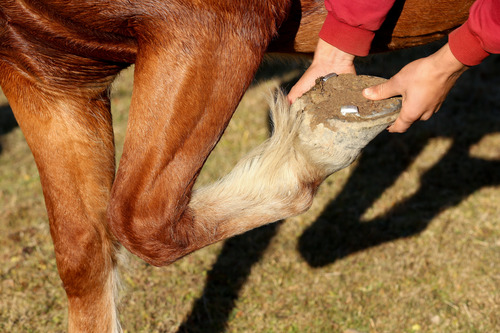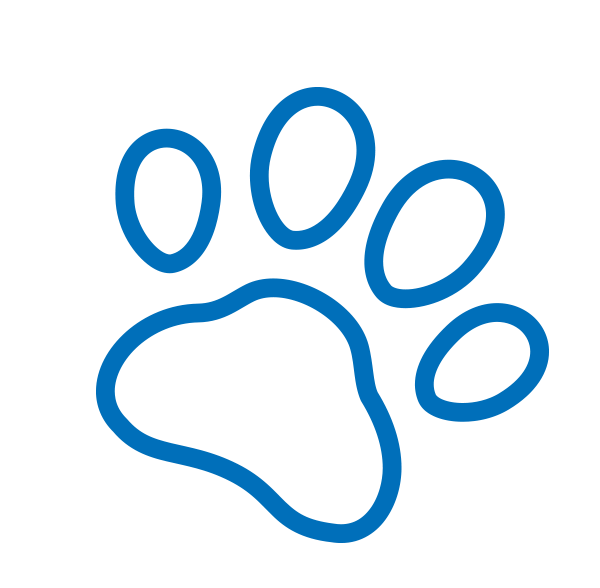When it comes to hoof care, horse owners often wonder: do all horses really need shoes? This depends on several factors, including the horse’s lifestyle, workload, terrain, and overall hoof health. While horseshoes offer valuable protection and support, not every horse requires them. Some horses thrive barefoot, while others benefit from the stability, traction, and performance advantages that shoes provide. Knowing why horses need shoes helps you make informed decisions about your horse’s care and comfort.
At Chino Valley Animal Hospital in Chino Valley, AZ, we help horse owners choose the best hoof care plan for their equine partners. Call (928) 636-4382 to schedule an appointment and discuss your horse’s hoof health with our experienced veterinary team.
The Purpose of Horseshoes
Horseshoes have been used for centuries to protect and support the hooves of working horses. A horse’s hooves naturally wear down through movement, but when a horse’s workload, activity level, or environment causes excessive wear or imbalance, shoes can help maintain proper function.
Shoes are typically made of metal, plastic, or composite materials and are shaped to fit each hoof. They are attached by a skilled farrier, who ensures proper alignment and comfort. For horses that perform on hard or uneven surfaces, the shoes act as a barrier between the hoof and ground, reducing the risk of cracking, bruising, and lameness.
Key Benefits of Horseshoes
- Protection: Prevents excessive hoof wear and damage from rough terrain.
- Traction: Provides grip and stability during work, sport, or performance.
- Support: Corrects gait abnormalities and relieves pressure on weak or injured structures.
- Performance: Enhances athletic ability for competitive or working horses.
When Horses Need Shoes
Not every horse needs shoes, but some absolutely benefit from them. Understanding why horses need shoes depends on factors such as workload, hoof condition, and terrain.
Workload and Discipline
Horses that regularly perform on hard, abrasive, or uneven surfaces like roadways, arenas, or rocky trails often require shoes. Performance horses such as jumpers, barrel racers, or ranch horses benefit from the extra traction and shock absorption that shoes provide.
Hoof Health and Structure
Some horses naturally have softer or weaker hooves that wear unevenly or crack easily. In these cases, shoes protect against damage and promote balanced movement. Horses recovering from hoof injuries, laminitis, or navicular disease may also need therapeutic shoeing to relieve pain and promote healing.
Terrain and Climate
Arizona’s rocky, arid environment can be hard on bare hooves. Horses that spend time on rough or gravelly terrain often require shoes to prevent soreness and chipping. Conversely, horses kept mostly on soft pasture or sandy soil may remain comfortable without them.
When Horses Can Go Barefoot
Many horses live comfortably without shoes, especially when their workload and environment allow it. Going barefoot can be beneficial if the horse’s hooves are strong, well-balanced, and properly maintained.
Barefoot horses often enjoy improved circulation, natural hoof wear, and greater proprioception (the ability to sense where their feet are). However, transitioning to barefoot care requires careful monitoring and regular trimming by a qualified farrier or your veterinarian.
Horses That May Thrive Barefoot
- Lightly ridden pleasure horses
- Horses kept mostly on soft pasture
- Young or retired horses with healthy hooves
- Horses with minimal exposure to rocky or paved terrain
Barefoot care requires consistent trimming to maintain balance and prevent overgrowth. Even without shoes, a proper hoof care routine remains essential to avoid discomfort or injury.
The Role of the Farrier and Veterinarian
Your farrier and veterinarian work together to ensure your horse’s hooves stay strong and healthy. Hoof balance affects the entire musculoskeletal system, influencing how your horse moves, bears weight, and performs.
How Farriers Help
Farriers assess hoof shape, growth, and wear to determine if shoes are necessary. They trim and shape the hoof to promote even weight distribution and prevent issues like flares, cracks, or imbalances.
How Veterinarians Contribute
Veterinarians identify underlying health concerns that affect the hooves, such as nutritional deficiencies, infections, or structural issues. Working with your farrier, your vet can help design a hoof care plan that supports both immediate comfort and long-term soundness. For horses with chronic hoof pain or conformational issues, therapeutic shoeing may be recommended. This approach uses specialized shoes or pads designed to relieve pressure and promote proper alignment.
Common Types of Horseshoes and Their Uses
There are many types of horseshoes, each serving a unique purpose depending on your horse’s needs and activities. Understanding why horses need shoes often comes down to selecting the right design and material.
Steel Shoes
The traditional choice for durability and strength. Ideal for performance and working horses.
Aluminum Shoes
Lightweight and often used for racehorses or show horses where agility is key.
Rubber or Composite Shoes
These flexible options offer excellent shock absorption, ideal for horses on hard or rocky ground.
Therapeutic Shoes
Specially designed for horses with medical conditions such as laminitis or navicular disease. They provide targeted support to relieve pressure and promote healing.
Glue-On Shoes
A good choice for horses with damaged hoof walls or those who cannot tolerate nails. Each type of shoe has unique advantages, and your farrier will help determine which is best based on your horse’s lifestyle, hoof condition, and workload.
The Importance of Regular Hoof Care
Whether your horse wears shoes or goes barefoot, routine hoof care is essential for comfort and mobility. Hooves grow continuously, and without proper trimming, imbalances can lead to lameness or injury.
Regular Farrier Visits
Schedule farrier visits every 6–8 weeks to maintain balance and prevent overgrowth. Regular care keeps your horse’s hooves properly shaped and minimizes stress on the joints and tendons.
Daily Inspections
Check your horse’s hooves daily for cracks, embedded debris, or signs of tenderness. Clean them out with a hoof pick to remove stones and dirt that could cause bruising or infection.
Balanced Diet and Hydration
Nutrition plays a major role in hoof quality. A balanced diet rich in biotin, zinc, and amino acids supports strong hoof walls and healthy growth. Always provide fresh water and access to shelter, especially in dry climates like Chino Valley.
Transitioning Between Shod and Barefoot
If you’re considering transitioning your horse from shod to barefoot (or vice versa), it’s best to do so under professional guidance. Sudden changes can cause soreness or imbalance if not managed carefully. A gradual approach allows the hooves to strengthen and adapt. Your farrier may suggest hoof boots during the transition to protect against soreness on rough terrain.
Your veterinarian can also evaluate hoof condition and recommend supportive care if needed. Every horse adapts differently, so patience and consistency are key. With the right care, your horse can remain comfortable and sound during the transition period.
Building a Hoof Care Plan That Fits Your Horse
Every horse is unique, and there’s no one-size-fits-all answer to why horses need shoes. Some require extra protection to perform at their best, while others stay comfortable and healthy barefoot. What matters most is providing regular, professional hoof care that supports your horse’s comfort, balance, and long-term performance. Our veterinarians at Chino Valley Animal Hospital are here to guide you through every step of your horse’s hoof care plan. We collaborate with trusted farriers to help your horse move soundly, whether they’re galloping across a pasture or competing in the arena. Call (928) 636-4382 to schedule an appointment and receive high quality care for horses at Chino Valley Animal Hospital with our experienced equine care team.




